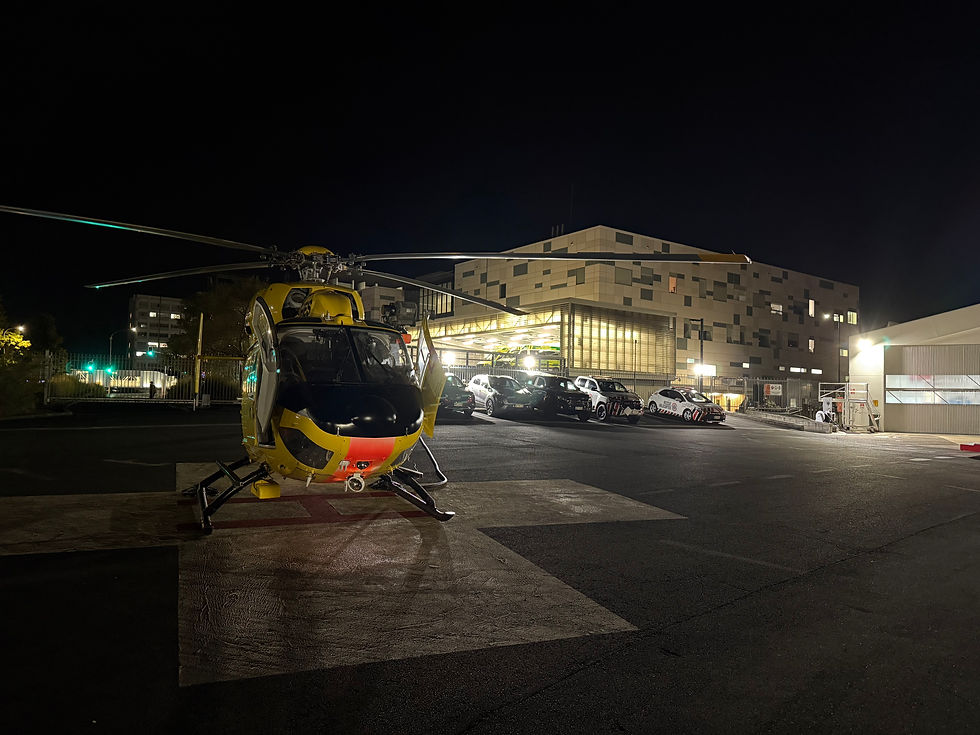You’re scared and you’re unsure - you just know that going in the helicopter you’re heading to the right place. It was a massive relief to be in the rescue helicopter’.
- lily8999
- Nov 2, 2022
- 3 min read

At 10.45am Laurence Corlett phoned his wife to let her know he was having a heart attack. Just two hours later, he was landing at Waikato Hospital – having flown on a crucial transfer flight with Taranaki Rescue Helicopter.
Fit and healthy, 43-year-old Laurence was the kind of guy that attended CrossFit and Jiu-Jitsu sessions multiple times every week and even completed a half-marathon just two weeks prior. But on the morning of his heart attack, he knew something wasn’t quite right.
‘I was doing Jiu-Jitsu and felt really exhausted, absolutely gassed. I was just thinking this is weird, this is not right. I should not be this tired doing five minutes of rolls’.
His intuition proved to be right, and it wasn’t long into his Jiu-Jitsu training that he suspected he might actually be having a heart attack. Not wanting to worry his mates, Laurence headed out the door and phoned his wife, Paula - simply saying ‘I’m having a heart attack’.
Paula rushed Laurence to the hospital where he was immediately taken through to the emergency department. By the time his wife parked the car and came inside he was hooked up to all sorts of machines and was surrounded by the medical team. Laurence recalls being told he was going to be transferred to Hamilton in the Taranaki Rescue Helicopter.
‘I was scared, I was panicking, and they said you’re having a heart attack but don’t worry we will get you in the helicopter to Hamilton’
Before this could happen, Laurence needed thrombolysis but then he went into cardiac arrest while still in the resus bay of the emergency department. For five terrifying minutes medical staff worked to resuscitate Laurence.
‘My poor wife was in the room the whole time… they asked if she wanted to leave but she said no, she wanted to stay and help me through. Luckily after about 5 minutes I came back into the land of the living’
While this was an incredibly frightening experience for both Laurence and his wife, boarding the Taranaki Rescue Helicopter and meeting the crew provided them with relief. Initially scared about going on the helicopter, worried that he might suffer another heart attack, Laurence found himself feeling calmer throughout the flight.
‘You’re scared and you’re unsure - you just know that going in the helicopter you’re heading to the right place. It was a massive relief to be in the rescue helicopter’.
More than a third of missions completed by Taranaki Rescue Helicopter are inter-hospital transfers. These crucial flights allow patients to reach hospitals where they can access the specialist treatment they need. For a patient like Laurence, getting to specialists at Waikato Hospital in the shortest amount of time possible was crucial, and without the rescue helicopter his story could have had a different ending
When talking about the importance of the Taranaki Rescue Helicopter, Laurence knows how lucky and privileged they were to have a lifesaving service like this available.
‘You don’t think it will happen to you, but it could happen to anyone. It’s vital. Time is just so vital, and time is of the essence in a situation like this’.
Laurence recalls the calming effect that came over him while on the rescue helicopter on-route to Waikato Hospital. Knowing he was in the capable hands of the crew also helped his family. He had three teenage sons who were sitting at home incredibly worried, and for them knowing he was in a safe place and heading to the specialist care he needed in Hamilton helped them understand he was going to be okay.
Laurence is now home in New Plymouth and recovering, thinking back to his experience he can’t believe how quick the entire journey was – from feeling unwell to arriving at Waikato Hospital, he is sure that speed played a large role in the outcome and his overall recovery.
‘To get me from having a heart attack at Jiu jitsu in New Plymouth to the specialist care I needed at the hospital in Hamilton in two hours is an amazing service. The speed and how amazing they made me feel, we’re so lucky to have that’.

























Comments